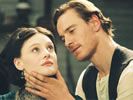Eye For Film >> Movies >> Angel (2007) Film Review
Angel
Reviewed by: Susanna Krawczyk

If you’ve ever read a rags-to-riches romance story the formula will be familiar: Angel, only daughter to her widowed greengrocer mother, dreams of becoming an author at the turn of the 19th century. She spends all her time writing and dreaming of living in Paradise House, a nearby mansion. She abhors her mother’s simple life and carries herself with (what she imagines) to be the air of an aristocrat. And she might just have the determination to make her dreams come true. In adapting Elizabeth Taylor’s semi-satirical novel about the life of a romantic novelist, François Ozon has brought the melodrama and intrigue to the big screen.
Romola Garai is Angel; beautiful, talented and arrogant. She brings a fantastic amount of personality to the part and is surprisingly charming, given Angel’s wild and destructive flights of fancy and demented superiority complex. Even in Angel’s most selfish and socially unpolished moments it is clear she is a woman of strong drive and a force to be reckoned with. Garai blazes her way through every scene with wide eyes and a dramatic turn of phrase.

The visuals have a lush and slightly surreal feel – the cinematic equivalent of prose that is slightly on the purple side. Costumes particularly are gorgeous and detailed, especially in the case of Angel, who gets progressively more eccentric and ostentatious as her star rises. Sets, too, are lovely and immersive. They make an excellent backdrop to the dramatic life of Angel Deverell - a life peppered with (what she would no doubt call) supporting characters: her mother (Jacqueline Tong) who never understood her, her publisher Théo and his wife (Sam Neill and Charlotte Rampling), her biggest fan Nora (Lucy Russell) and the love interest, Nora’s brother Esmé (Michael Fassbender). Russell in particular puts in a fascinating and nuanced performance as Angel’s adoring admirer, and it’s through her that we see how Angel might really be, stripped of her affectations and inflated sense of the dramatic.
Truly it is through this lens that we see the story: Angel’s obsessive need to imbue her most mundane moments with intrigue and glamour. From tragic scenes of poverty and deprivation to dramatic declarations of love in the rain, we’re never quite sure that what we’re seeing is how things might look to someone other than Angel.
The juxtaposition of the opulence and indulgence of Angel’s lifestyle with the horrific fact of the First World War (and Angel’s response to it – to write more sensational novels) along with the effect it has on Esmé drive this home further. Fassbender’s performance is excellent here – he ably portrays a conflicted young man with responsibilities and loyalties outside of Angel’s comprehension. His and many others’ (including the amusingly prim and moustachioed Sam Neill) affection for Angel and her unpleasant character traits seems hard to understand until we grasp that we are not getting an objective version of the story. We are seeing Angel only as she demands to be seen.
As period pieces go, Angel is atypical. It’s not a tale about lovely dresses and horseriding and cocktail parties and balls – as much as its protagonist would like it to be. It’s a far more personal tale about people and ambition, fantasy, love and necessity. And it tells the story of an extraordinary person in an extraordinary way.
Reviewed on: 14 Feb 2008
















